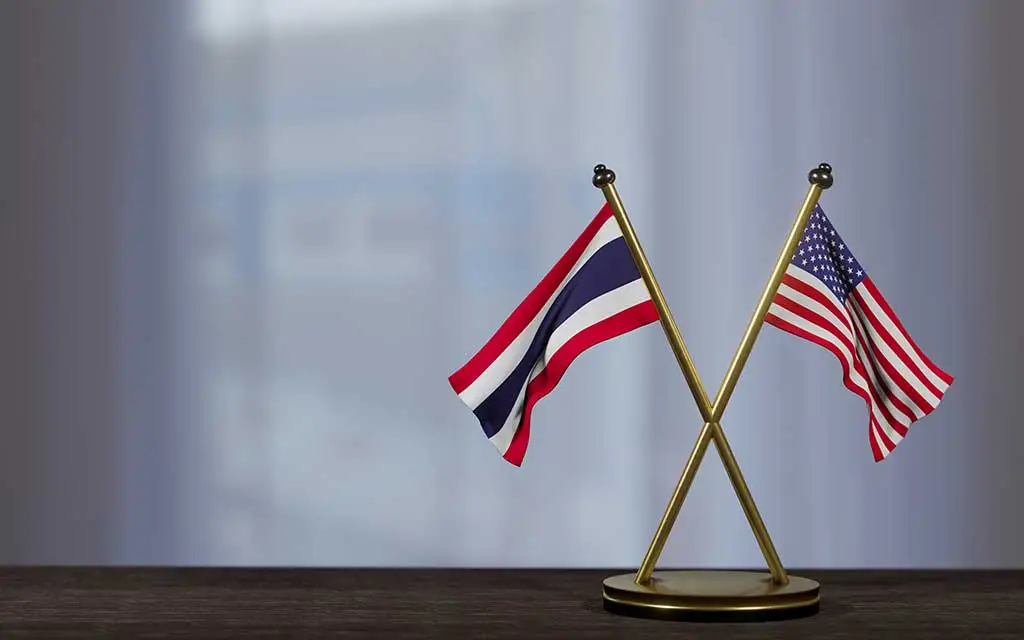The US-Thailand Treaty of Amity and Economic Relations (1966) offers significant trade and investment benefits to American companies operating in Thailand, allowing them to hold a majority share in businesses within most industries. Unlike other foreign-owned enterprises under Thailand’s Foreign Business Act (FBA), U.S. companies can have up to 100% ownership in eligible businesses, with fewer restrictions on operations and a streamlined business registration process.
1. Historical Context and Purpose of the Treaty
The Treaty of Amity was established in 1966 to foster stronger economic ties between Thailand and the United States. It provides American businesses preferential treatment, allowing them to bypass many restrictions that apply to foreign companies under the FBA, especially regarding ownership and operational control.
This preferential status aims to boost bilateral trade, increase American investment in Thailand, and promote technology transfer and knowledge exchange between the two nations.
2. Key Benefits of the Treaty
a) Ownership Flexibility
The treaty allows U.S. companies to own up to 100% of a business in Thailand, except in restricted sectors. This is significant, as the FBA typically limits foreign ownership to 49% for most industries.
b) Reduced Barriers to Entry
Companies with treaty status face fewer regulatory barriers, as they are generally exempt from FBA requirements. This eases the registration process, reduces compliance costs, and improves operational flexibility.
c) Improved Market Access
With the treaty’s advantages, U.S. companies can freely engage in most business activities, making it easier to establish a presence in Thailand and compete in the local market.
3. Limitations and Exclusions of the Treaty
Despite its benefits, the Treaty of Amity has specific limitations:
- Restricted Industries: The treaty does not cover all sectors. Restricted industries include:
- Land ownership
- Natural resources exploitation
- Transportation
- Communications
- Domestic trade in agricultural products
- Additional Licensing Requirements: Businesses in certain sectors, like banking or telecommunications, may require separate licensing even with treaty protection.
- Compliance with Thai Laws: Although the treaty allows majority ownership, U.S. companies must still comply with local labor, tax, and environmental regulations.
4. Registration Process for Treaty of Amity Protection
To benefit from the Treaty of Amity, U.S. companies must apply for treaty protection through a structured process:
a) Certificate of Incorporation in the U.S.
The American company must be registered and operating in the United States before applying.
b) Application through the U.S. Commercial Service in Thailand
The company submits an application, including proof of U.S. ownership and incorporation. This submission is reviewed to confirm the company qualifies under treaty terms.
c) Thai Ministry of Commerce Approval
Once the U.S. Commercial Service certifies eligibility, the company applies for an FBA license from the Thai Ministry of Commerce. This step grants the company treaty status and the right to majority ownership.
The registration process typically takes several weeks, though the timeline may vary based on the business activity and the documentation provided.
5. Tax and Regulatory Considerations
Although treaty-protected companies enjoy many benefits, they remain subject to Thai taxation and regulatory compliance:
- Corporate Income Tax (CIT): U.S. companies with treaty status are taxed at the standard rate of 20%.
- Value Added Tax (VAT): Treaty-protected companies conducting VAT-eligible activities must register for VAT and comply with reporting requirements.
- Employment Regulations: Treaty companies must adhere to Thai labor laws, including minimum wage regulations, work permit requirements, and employee benefits.
Additionally, tax treaties between the U.S. and Thailand help avoid double taxation, allowing companies to manage tax obligations more efficiently.
6. Challenges and Considerations for U.S. Companies
Despite the treaty’s advantages, U.S. companies should consider:
- Renewal and Compliance: Treaty status requires ongoing compliance with both U.S. and Thai regulations. Companies that no longer meet ownership requirements may lose treaty benefits.
- Local Competition: The treaty grants access to the Thai market, but U.S. companies must navigate competitive local markets with a strategic approach.
- Regulatory Shifts: Changes in Thai investment policy or the Foreign Business Act could impact treaty provisions, especially if the Thai government revisits or reinterprets the treaty’s scope.
Conclusion
The U.S.-Thailand Treaty of Amity offers substantial benefits for American businesses, including majority ownership, reduced regulatory barriers, and enhanced market access. By understanding the application process, benefits, and limitations, U.S. companies can leverage the treaty to expand in Thailand while remaining compliant with Thai regulations. Partnering with local advisors or legal consultants can further help companies maximize their treaty privileges and successfully navigate the Thai business landscape.

